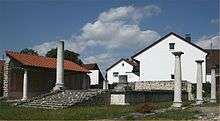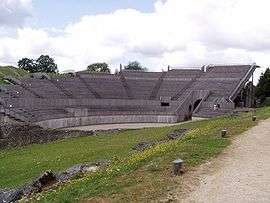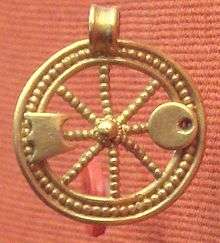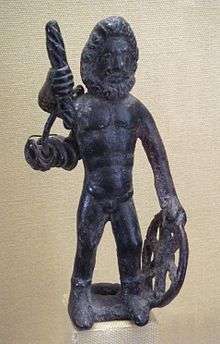Grannus
Grannus (also Granus, Mogounus,[1] and Amarcolitanus[2]) was a Celtic deity of classical antiquity. Based on the etymology of his name, Grannus may have been associated with spas, thermal springs, and the sun; having bushy hair, beard and/or eyebrows; or having a connection with the concept of shining/gleaming.[3] He was regularly identified with Apollo as Apollo Grannus. He was frequently worshipped in conjunction with Sirona, and sometimes with Mars and other deities.[4]

Name
Etymology
In the early twentieth century, the name was connected with the Irish grian, ‘sun’.[5] Along these lines, the god was often linked to the Deò-ghrèine and the character Mac Gréine of Irish mythology. However, the Irish grian, ‘sun’ is thought to be derived from Proto-Celtic *greinā ‘sun’ and the Proto-Celtic *greinā is unlikely to have developed into Grannos in Gaulish and other Continental Celtic languages. Derivation from a Proto-Celtic root *granno- ‘beard’ (cf. Middle Welsh grann ‘chin; beard, hairs’ and Old Irish grend ‘beard, hairs’) has enjoyed some scholarly support, from which Jürgen Zeidler dissents, proposing a different root *granno- with "probable reference to the sun's heat and healing properties".[6] Ranko Matasović, in his Etymological Dictionary of Proto-Celtic, has tentatively proposed that the root of this theonym comes from Proto-Celtic *gwrenso-, which means "heat";[7] however, Proto-Celtic initial gw- yields b- in Gaulish (cf. the name Brennus).
Epithets
At Monthelon, Grannus is called Deus Apollo Grannus Amarcolitanus[2] ("The one with a piercing or far-reaching look"[8]), and at Horbourg-Wihr Apollo Grannus Mogounus.[4][1]
In all of his centres of worship where he is assimilated to a Roman god, Grannus was identified with Apollo,[4] presumably in Apollo's role as a healing or solar deity. In Trier, he is identified more specifically with Phoebus as Apollo Grannus Phoebus.[9][4]
Centres of worship

One of the god's most famous cult centres was at Aquae Granni (now Aachen, Germany). Aachen means ‘water’ in Old High German, a calque of the Roman name of "Aquae Granni".[10] The town's hot springs with temperatures between 45 °C and 75 °C lay in the somewhat inhospitably marshy area around Aachen's basin-shaped valley region.[10] Aachen first became a curative centre in Hallstatt times.[10]
According to Cassius Dio, the Roman Emperor Caracalla (188 AD to 217 AD) unsuccessfully sought help from Apollo Grannus—as well as Aesculapius and Serapis—during a bout of physical and mental illness, visiting the god's shrine and making many votive offerings; Dio claims that the gods refused to heal him because they knew Caracalla's intentions to be evil.[11] Caracalla's visit to the shrine of ‘the Celtic healing-god’ Grannus was during the war with Germany in 213.[12]
In the early twentieth century, the god was said to have still been remembered in a chant sung round bonfires in Auvergne, in which a grain sheaf is set on fire, and called Granno mio, while the people sing, “Granno, my friend; Granno, my father; Granno, my mother”.[5] However, granno may simply be a derivative of an Occitan word of Latin origin meaning "grain" (compare Auvergnat gran "grain", grana "seed" and Languedocien grano, from Latin grānum "grain").
Festival
A 1st century AD Latin inscription from a public fountain in Limoges mentions a Gaulish ten-night festival of Grannus (lightly Latinized as decamnoctiacis Granni):
- POSTVMVS DV[M]
- NORIGIS F(ilius) VERG(obretus) AQV
- AM MARTIAM DECAM
- NOCTIACIS GRANNI D(e) S(ua) P(ecunia) D(edit)[13]
Translation: "The vergobretus Postumus son of Dumnorix gave from his own money the Aqua Martia ("Water of Martius [or Mars]", an aqueduct[14]) for the ten-night festival of Grannus".
Divine entourage
The name Grannus is sometimes accompanied by those of other deities in the inscriptions. In Augsburg, he is found with both Diana and Sirona;[15] he is again invoked with Sirona at Rome,[16] Bitburg,[17] Baumberg,[18][4] Lauingen,[19] and Sarmizegetusa (twice).[20] At Ennetach he is with Nymphs,[21] at Faimingen with Hygieia and the Mother of the Gods,[22] and at Grand with Sol.[4] A votive altar at Astorga invokes him after "holy Serapis" and "the many-named Isis", and before "the unvanquished Core and Mars Sagatus".[23][4]
References
- CIL XIII, 05315
- CIL XIII, 02600
- Zeidler, Jürgen (2003). "On the etymology of Grannus". Zeitschrift für celtische Philologie. 53: 77–92.
- Patrice Lajoye. Un inventaire des divinités celtes de l’Antiquité. Société de Mythologie Française. See also the inventory's introduction. (in French)
- J. A. MacCulloch. 1911. "The Gods of Gaul and the Continental Celts." The Religion of the Ancient Celts.
- Xavier Delamarre (2003). Dictionnaire de la langue gauloise. Éditions Errance, Paris, pp. 182-183. The quoted text is «référence probable à la chaleur du soleil et ses propriétés curatives».
- R. Matasović, Etymological Dictionary of Proto-Celtic (Leiden, 2009) p. 147, s.v. *gwrīns- / *gwrenso-
- Zeidler, Jürgen, "On the etymology of Grannus", Zeitschrift für celtische Philologie, Volume 53 (1), de Gruyter. 2003, p. 86.
- CIL XIII, 03635
- Dr. Rita Mielke. History of Bathing. Aachen.
- Cassius Dio, Roman History 78.15.
- CIL VI 2086; IvEph 802
- AE 1989: 521; AE 1991: 1222.
- Laurent Lamoine, Le pouvoir local en Gaule romaine, Presses Universitaires Blaise Pascal, 2009, pp. 114-115.
- AE 1992, 01304
- CIL VI, 00036
- CIL XIII, 04129
- CIL III, 05588
- CIL III, 11903
- AE 1983, 00828
- CIL III, 05861
- CIL III, 05873
- AE 1968, 00230. The dedicant is Julius Melanius, an imperial governor.
External links
| Look up Grannus in Wiktionary, the free dictionary. |


